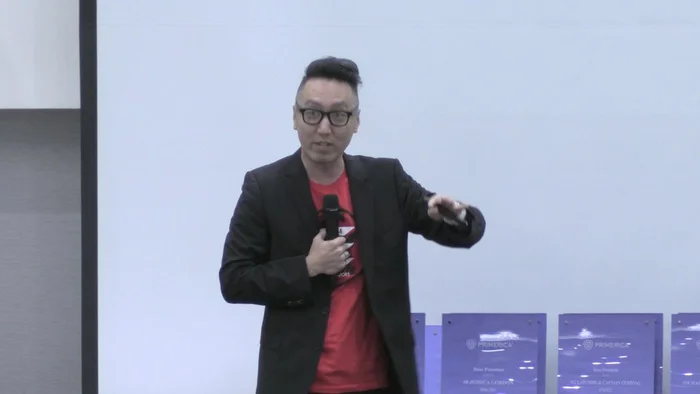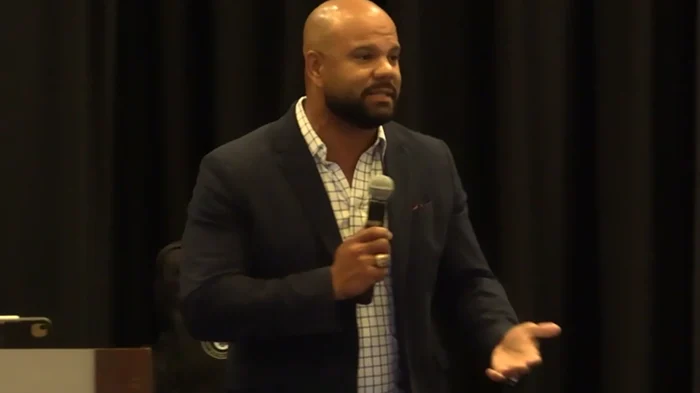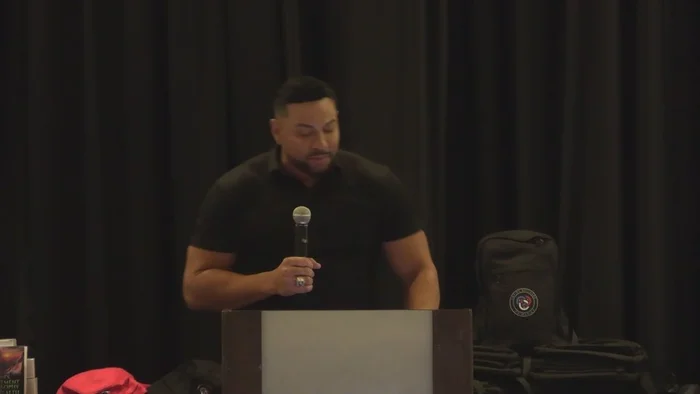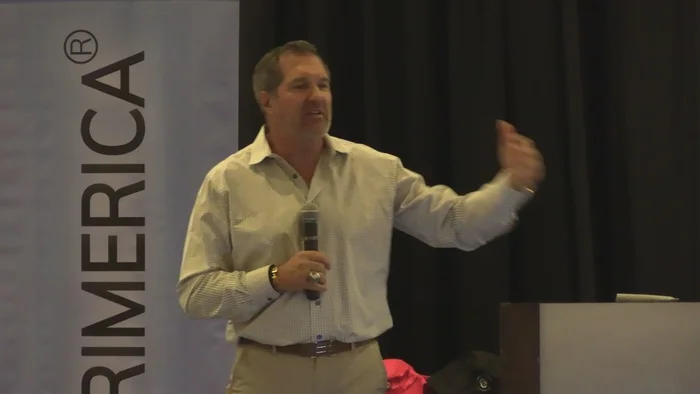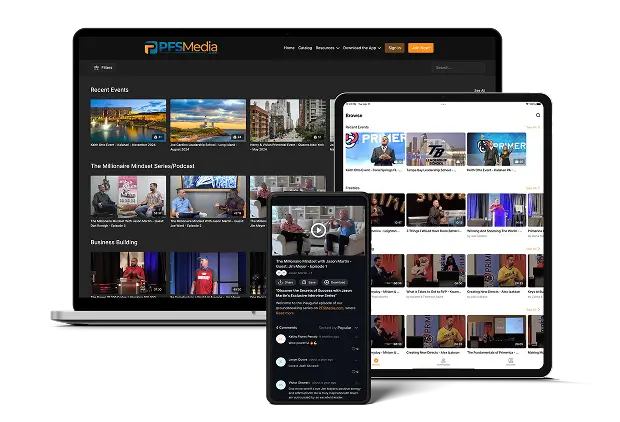Ever feel like you’re putting in the hours, but the results just aren’t showing up? You’re not alone. Many reps struggle with the concept of delayed gratification, expecting instant success in a business that thrives on perseverance and patience. But what if you could shift your mindset and see the bigger picture? What if you could embrace the journey and trust that the rewards are worth the wait? That’s exactly what David Kim dives into in this powerful session. He breaks down the secret sauce of success: understanding and mastering delayed gratification. It’s eye-opening, relatable, and exactly what you need if you’re serious about building a sustainable business. Watch the video below and discover the mindset shift that could change your Primerica journey forever.
Video Transcription:
I want to start off.
I’m the last speaker before lunch break.
Okay? So don’t go anywhere.
Don’t go anywhere.
You don’t want to miss out.
First of all, I just want to recognize some of the teammates.
As far as rallying future rvps, not even RVP’s yet, which.
Stand up.
20 tickets bought.
20 tickets bought right out of the gate.
Harold and Naomi, if you guys can stand up.
Also purchasing 20 tickets right out of the gate.
We have.
Where’s Mar.
Where’s Marilyn? Maryland.
Stand up 40 tickets.
These are future rvps, right? Where’s Arona and Shiv? 60 tickets.
You know, the secret sauce of this business is rallying, and that’s not my topic here.
Right out of the gate.
But I want to talk about, really, it’s.
You know, if you looked at the title, it says it’s marshmallows.
And people go, why do.
What does this have to do with anything? I’m going to get into the experiment, but before I do, you know, it’s interesting.
When you hear people talk about Primerica that doesn’t understand primerica, they go, is that one of those get rich quick schemes? Is that.
And the irony of that is when they don’t get rich quick, they think it’s a scam.
It doesn’t work.
We understand there are certain kind of acceptances that we embrace.
And in my household, I grew up and I heard this, get good grades on your sats so you can get into a good college.
Get to a good college, so you get a good job.
You get a good job to have good benefits, and you can live happily ever after.
We understand that right now.
This whole college process, if you think about it’s what they call delayed gratification.
We understand.
And we accept that when we go to college, that we’re not going to start making money until after four years.
If not, maybe sometimes six years.
We understand that.
Like, how many of you guys right now, you have a full time job.
Full time job.
Now imagine.
Imagine you went to your family and said, hey, I’m gonna go back to school, to grad school.
You’re gonna have to hold down the fort.
I’ve got classes three times a week.
You can’t disturb me on Tuesdays, on Thursdays and Fridays because I have class, so I can get a degree, and I’m gonna spend 80 grand getting this degree.
And you know what your family members say? They good job.
Wow.
So proud of you, man.
You must really love your family.
You want better for your family.
Congratulations.
Good job.
They give you one of these, and they’ve accepted the people around you have accepted that you will be out on hiatus, that you can’t go to family functions or you can’t go bowling.
You can’t do those things for the next two years, right? Yes.
You don’t go and say, I’m gonna be a doctor in freshman year, when you get together a family function during a Christmas party, and they look at you at, have you made any money yet? They’ve already accepted that you being a doctor to make the big money.
It’s a plan for the next eight to ten years.
They’ve accepted that? Right? You’ve accepted that? Yes.
We understand that there’s delayed gratification for the things that we’ve accepted in that course.
But for whatever reason, because people don’t understand the Primerica business model, you start Primerica a month later, it’s like you didn’t make any money yet.
Hey, I told you.
It’s a twelve to 18 month game plan to get to regional vice president so I can make a six figure income.
So don’t bother me for 18 months.
Don’t bother me on the weekends.
Don’t bother me in the evenings.
I’m here to build my business for the next 18 months.
And people go, what kind of scam is that? You know, they did experiment.
Anybody ever hear of the marshmallow test? So what they did in Stanford University, what they did was they got a bunch of kids together.
And this experiment.
This is the way the experiment worked.
They left the kid alone for 15 minutes.
They put a nice marshmallow right in front of the kidney.
And they say, don’t eat that marshmallow.
And this was the instructions.
When we come back, we’re going to give you a second marshmallow right now.
How do you think little kids behaved? It was a very interesting experiment because when they left the kid alone, they had cameras watching.
And some of the kids, you’d be surprised the way they reacted.
They would sit there.
They would, like, in their seats.
Some of them would just block their eyes, hoping that the marshmallow would, like, somehow go away.
Some kids would sniff the marshmallow.
Some of them would lick it, thinking that it’s okay.
Because if I lick it, I’m not eating it.
Right.
I mean, it’s just bizarre.
And what ended up happening from the study, what’s interesting is the Stanford University study.
They were trying to see and monitor and experiment with this thing called delayed gratification and what we call self regulation.
What they did was they followed up the kids that actually withheld and had delayed gratification.
They had the self regulation.
They would follow up with all the children to see how they did in the later years.
And this is an interesting study because what they showed was the children who had the most delayed gratification, the children that had the most self regulation to hold off the longest, tended to score better on their sats.
They tended to go into better jobs, getting paid better income.
There’s a correlation there.
Now, when you look at the study, you go, well, some people have better self regulation.
They’re born that way.
There’s a second study.
And the Rochester experiments followed up with this original experiment.
And this was fascinating because what they did was there were two groups.
They were what they call the reliable and the unreliable group.
It’s a fascinating study if you start looking into this.
So they would take these kids in a room and they would start an art project.
And in the art project they said, hey, if you wait, before you begin the.
Cause, they were just basic art supplies.
If you wait, the teachers are gonna bring new supplies with new crayons.
You know the crayons with like, 200 colors, right? Those are.
You guys know what I’m talking about.
You guys have kids, right? They said, if you wait for the teachers to come back, we’re going to bring brand new supplies.
And you know what? Every one of those children waited.
They opted to wait.
They said, wow, we’re going to wait.
We’re not going to start the art project until you come back.
Now, the two groups with the reliable and the unreliable.
The reliable group.
The teachers came back with the new supplies.
Children were happy.
Now, this is what’s interesting.
The unreliable group.
The teachers came back.
They apologized.
They said, we’re sorry, we ran out of supplies.
The children obviously were very disappointed.
Doesn’t end there.
They continued the marshmallow experiment from that point on.
And what they did was they sat the same children from the reliable and the unreliable group.
They sat them down and they said, if you wait 15 minutes, we’re going to come back with two marshmallows.
And the interesting part of this study is the reliable group that got the new supplies from their art projects.
They weighed it almost four to five times more than the unreliable group.
What does that say? You see, the unreliable group, which it’s really talking about children who feel like if they wait, there’s no reward at the end, has a lot to do with the environment that you grew up in.
It’s kind of like if you grew up with like, eight brothers and sisters.
If you don’t hurry up and eat the food right, it’s going to be gone.
Right, Ray? Where’s Ray? Right? You got to hurry up, because you know that waiting doesn’t pay off.
And some of us grew up in an environment like that.
We come into Primerica, we want now, now.
Don’t see the results right now.
And you leave.
And what we’re talking about here is in Primerica, what you’ll see is everybody desires to build a business.
Everybody does.
If you ask somebody, how many of you guys would want residual income? Everybody would want that.
Who wants to really work for the rest of their life? They don’t.
But the question that you got to ask yourself, how many of us are able to self regulate and have delayed gratification to build a business? That’s really the question.
How long can you withstand it? Are you coming from an unreliable group where your environment didn’t pay off? That’s why you just want everything now and you can’t wait for the bigger pot of gold.
I see a lot of people, they walk around and they constantly are picking up the change off the floor, meaning that they’re looking for just the quick money, the small money.
And I’m like, listen, just pick your head up.
There’s a huge pot of gold at the end of the rainbow right there.
Just look right there.
It’s just maybe 18 months out, and yet we’re still constantly chasing after the hourly wages, the overtime hours.
We want passive residual income.
We want financial freedom.
And let me show you some examples.
You may not be able to see this.
This gentleman says, in 1973, Spencer Heywood had a choice of contract.
He could have gotten $100,000 back in 1973 or 10% of Nike.
What do you think his self regulation told him to do? Now, $100,000 was a lot of money back in 1973.
Right, Joe? Right.
He took the hundred thousand dollars.
Today, that 10% is worth $12.4 billion.
How about this? The billionaire that never was Ronald Wayne was the third co founder of Apple.
Did you know that there were three co founders of Apple? Steve Wozniak, Steve Jobs, and Ronald Wayne.
We never hear from Ronald Wayne.
Why? Because in 1976, he sold 10% stake in Apple for $800.
Today, his stake would be over.
Would be worth over $90 billion.
Is that crazy or is that crazy? And you look at stories like that and you go, you know, what a dumbass, right? I can’t believe he would do that.
You know, I want to speak and I want to give recognition to my original recruiter, Ron Davis.
Ron Davis was in for a very short period of time.
He never field trained me.
He never did a one one with me.
He didn’t do anything for me except the biggest thing he did was recruit me in the business.
I will build a shrine for him.
As much as people say, oh, they didn’t do anything for.
He didn’t do anything for me except the biggest thing, which was introduced me to Primerica.
Now I would memorialize him by putting up a picture of his face and saying, you know how much override he lost out on for quitting? And that could be a big one, too.
But look at this.
In 2005, graffiti artist David Cho was offered $60,000 to paint murals at Facebook headquarters.
He chose to take the compensation in stocks, eventually being worth more than $200 million.
Now this guy right here, this guy had self regulation.
He had delayed gratification.
There’s going to be a lot of stories like that out there for you guys that you could take the immediate job right now that paid you $100,000 or you could journey with the Primerica venture.
Now, key takeaways.
Everyone starts at the same place called the beginning.
But everyone’s beginning may start at a different point.
That has a lot to do with your experience level.
That has a lot to do with your market.
That has a lot.
I came into Primerica with no business experience, so it took me a little bit longer.
People go, it took you five and a half years to get to RVP.
You’re a slow learner.
Okay, I’ve been doing this for 20 years now.
Where are you? I think about where we start off.
Everybody starts off at the same place as a rep here.
But what you come into it as at different stages in your life experiences, nothing worthwhile can be achieved overnight.
And you’ve heard the saying, Rome wasn’t built overnight and all that stuff, right? I.
And you can only use that as long as you’re working this business because relationships take time to develop.
You could learn this business quick.
You might have already good people skills and all that stuff, but your people may not.
That’s what takes time in this business.
Trust that the end result is incredibly worthwhile.
This business is 1000 times better when you’re living through it and living the rewards of all the work that you put in.
I’m going to challenge everyone in here.
Keep the big, the long term focus in sight.
Don’t lose sight of all the distractions that are happening around you left and right.
Just stay the course.
Just stay the course.
We’re proud to be in business with you guys.
Thank you.
